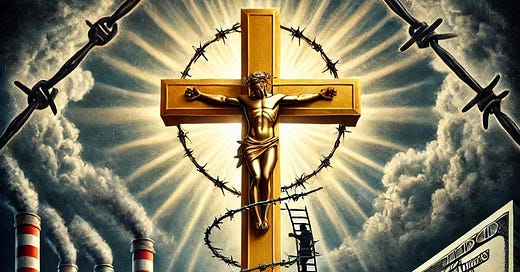The Prosperity Gospel: Christianity and the Foundations of Capitalism
And the Path to Whiteness
As we continue our series, “I Want to Wish You an Eschatological Christmas,” we delve deeper into how Christian theology laid the groundwork for capitalism. Following The Faithful Road to Wealth, this article uncovers the systemic relationship between Christian narratives and the global economic systems that prioritize profit over people. We will explore how capitalism is rooted in doctrines that sanctified wealth hoarding, exploitation, and inequality, setting the stage for racial hierarchies that will be addressed in the next article, "Constructing Whiteness: Christianity and Racial Hierarchies."
This is more than an exploration of history—it’s a call to action. By understanding how theological constructs like the Prosperity Gospel intersect with capitalism, we can begin to dismantle these systems and build a future rooted in equity, liberation, and collective care.
Recap: From Doctrine of Discovery to Manifest Destiny
In “The Faithful Road to Wealth”, we examined how Christian theology justified land theft, genocide, and systemic inequality through frameworks like the Doctrine of Discovery and Manifest Destiny. These narratives framed the acquisition of land and wealth as divine mandates, deeply intertwining faith with systems of domination and exploitation.
This foundation of supremacy culture paved the way for capitalism, which thrives on the exploitation of labor and resources. But capitalism didn’t just emerge—it was sanctified through theological narratives that tied material success to divine favor, framing wealth as virtuous and poverty as a moral failing.
The Prosperity Gospel: God Wants You to Be Rich
The Prosperity Gospel, a modern theological movement, exemplifies the intersection of Christianity and capitalism. It teaches that financial success is a sign of divine favor and that wealth is not only permissible but encouraged as evidence of faithfulness. Central tenets of the Prosperity Gospel include:
Wealth as Divine Favor: Material success is framed as evidence of God's blessings.
Poverty as Moral Failure: Lack of wealth is attributed to individual shortcomings in faith or effort.
Seed Offerings: Congregants are encouraged to "invest" in their spiritual and financial future by giving generously to the church.
This theology reinforces the capitalist ethos of individualism and self-reliance while obscuring systemic barriers like racism, sexism, and economic exploitation. The Prosperity Gospel shifts the blame for poverty from structural systems to personal morality, perpetuating inequality.
The Capitalist Gospel in Action: Global Implications
Capitalism, rooted in colonial exploitation, relies on the extraction of resources and labor. The Prosperity Gospel serves as a theological justification for these systems, turning greed into virtue and exploitation into providence. Here’s how:
1. Sanctifying Inequality
The Prosperity Gospel reframes systemic inequality as God’s will. By equating wealth with spiritual success, it absolves the wealthy of accountability for exploitation and deepens the stigma against those in poverty.
2. Exporting Inequality Globally
This theology is not confined to the U.S. Megachurches in Africa, Asia, and Latin America preach similar messages, often funded by Western institutions. These narratives erase histories of colonial exploitation while perpetuating the same economic hierarchies globally.
3. Environmental Exploitation
Capitalism’s relentless demand for growth is mirrored in Prosperity Gospel teachings that prioritize material accumulation. This ideology justifies environmental degradation, framing resource extraction as part of God’s plan for dominion over the earth.
The Prosperity Gospel’s Role in Racial Capitalism: Expanding the Conversation
The Prosperity Gospel doesn’t just sanctify class inequality—it reinforces and sustains racial hierarchies that are foundational to capitalism. By equating wealth with moral virtue and poverty with personal failure, this theology erases the systemic barriers that prevent Black and Brown communities from accessing the same opportunities for economic mobility as their white counterparts. It perpetuates a narrative of individual responsibility while ignoring the deep, historical roots of racialized capitalism—a system built on the exploitation of enslaved Africans, the genocide of Indigenous peoples, and the ongoing marginalization of other oppressed groups.




